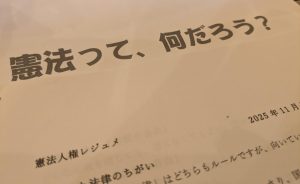ニュース詳細
![]() 2025.11.13
2025.11.13
第2回目のJFCユースの勉強会のご報告です♪
さて、第2回目のJFCユースの勉強会のご報告です。(※English is below.)
この勉強会の目的は、日本国籍のあるJFCたちが一人の有権者として、選挙の際に1票を投じるために、日本の政治体制を理解してもらうこと、そして、フィリピンで生まれ育ち、日本に移住をして生活をしている日本語ネイティブでないJFCたちのために、タガログ語、英語、日本語で資料と動画を作り、日本の政治システムや政治体制についての理解を深めてもらうことにあります。
JFCの中には、日本国籍を持つ人も持たない人もいます。日本国籍を持たないJFCたちは投票権がありません。しかし、日本国籍を持つJFCたちは、それを持たないJFCたちの声を代わりに日本の国に届けることができるのです。とかく「外国人排斥」の風潮が強くなっている今、JFCたちは「外国人」としても「日本人」としても、とても不安な状況に置かれています。
第1回目の弁護士の西田美樹先生からの講義「日本の政治体制と国政選挙」がとても好評だったため、インターン生やJFCユースの学生さんを誘ったところ、5人の参加がありました。西田先生は体調不良で残念ながらオンラインとなりましたが、途中30分の昼食時間を挟んで10時半~14時半まで、内容の濃いとても充実した講義をして頂きました。
今回のテーマは「憲法と人権」。西田先生は憲法をこよなく愛する一人として、憲法を熱く熱く語ってくださいました。
「憲法に”愛”が書かれている箇所はありますか?」
西田先生の講義はこの質問から始まりました。前回も同じです。さて、みなさん、わかりますか? せっかくなので憲法を読んで確認してみてください。https://www.shugiin.go.jp/internet/itdb_annai.nsf/html/statics/shiryo/dl-constitution.htm
まずは憲法は国の権力を縛るルールであり、法律は国民が守るルールだという、両者の違いの再確認からはじまりました。
国は力を持っているからこそ暴走しないように憲法でしばる必要がある、そして、その考え方を「立憲主義」ということの説明を受けました。(※最近誰かさんが「私はそうした主義をとってない」と言ってましたね。」
日本国憲法の中心にあるのは「個人の尊厳」であり、それは「あなたはあなたの人生の主人公だよ」という考えだということ。
憲法の三大原理(国民主権、基本的人権の尊重、平和主義)の中で、今回は「人権」についての話でした。
人権とは何か? それは人が生まれた時から持っている「人として大切にされる権利」。
よく「義務を果たしてないから、そんな権利はない」と言っているのを耳にしますが、それは間違っていて、「人権はがんばったご褒美ではなく、生まれながらの約束」ということです。
その後、いくつかの人権が書かれている条文を一つひとつ丁寧に確認しました。信教の自由、表現の自由、職業選択の自由、学問の自由、婚姻の自由。こうした当たり前だと思える自由について、なぜこ条文にしているのか。それは歴史上、ここに書かれている人権が脅かされた事実があるからだという話がありました。
そして、憲法には、3つの「国民の義務」が書かれていることの説明がありました。「教育、勤労、納税」の義務です。しかし、この3つの義務を果たしてないからといって人権がないのではなく、人権は「生まれたときから持っているもの」で誰からも取り上げられないのです。
西田先生はとても熱く語っていました。
「どんなに少数でも、どんな立場でも人権はあります。それを侵やかされそうになったら「いやだ」と言っていいんです。みなさんにもおかしいと思うことはありませんか?」
話は本当にいろいろな方向へ脱線したりして、途中、みなさんからたくさんの質問が出ました。
・憲法に書かれている「国民」」には外国人は入るのですか?
・労働基準法が適用されない職種があるのはどうしてですか? 人権侵害じゃないですか?
・日本人の子であるのは、18歳以上になったって同じなのに、18歳までしか認めないのはおかしいですよね?
などなど。
14時半に勉強会を終えて、事務所に来て参加した4人で雑談をしながら、テーマをいろいいろ決めて、わかりやすく飽きない程度の長さの動画がいいのではないか、とか、もっと頻繁にこういうのやりたい、とか、楽しく盛り上がっていました。
お昼ご飯はスタッフの市原が事務所で作ったカレーをみんなで食べました。
とても有意義な勉強会でした。次回は1月に予定しています。
This is a report on the second JFC Youth study session.
The purpose of this study session is to help JFCs with Japanese nationality understand Japan’s political system so they can cast their vote as individual voters during elections. It also aims to deepen the understanding of the Japanese political system and structure for JFCs who were born and raised in the Philippines, have immigrated to Japan, and are not native Japanese speakers. To achieve this, materials and videos were created in Tagalog, English, and Japanese.
Among JFCs, some hold Japanese nationality while others do not. JFCs without Japanese nationality do not have the right to vote. However, JFCs who do hold Japanese nationality can represent the voices of those without it and bring their concerns to the Japanese government. In these days when anti-foreigner tendencies are growing stronger, JFCs find themselves in a very uncertain situation, caught between being seen as “foreigners” and “Japanese.”
The first lecture by Atty. Miki Nishida, titled “Japan’s Political System and National Elections,” was very successfully held. We invited interns and JFC Youth students, resulting in five participants. Unfortunately, Atty. Nishida was unable to attend in person due to her health and joined online. The lecture ran from 10:30 AM to 2:30 PM, including a 30-minute lunch break, and was rich in content and highly fulfilling.
This session’s theme was “The Constitution and Human Rights.” As someone who deeply loves the Constitution, Atty.. Nishida spoke passionately and enthusiastically about it.
“Is there a place in the Constitution where the word ‘love’ is written?”
Atty.. Nishida began her lecture with this question. It was the same last time. So, everyone, do you know? Since everyone is here, why not take this chance to read the Constitution and check for yourselves?https://www.shugiin.go.jp/internet/itdb_annai.nsf/html/statics/shiryo/dl-constitution.htm
First, she began by reconfirming the difference between the Constitution and laws: the Constitution is the rule that restricts the power of the government, while laws are the rules that citizens must follow.
We were told that it is necessary to restrain the government with the Constitution to prevent it from running out of control because the government has the power to do so, and that this concept is called “ Constitutionalism.” (※Recently, someone said, “I don’t have such principle.”)
At the center of the Constitution of Japan is “the dignity of the individual,” which is the idea that “you are the person in charge of your own life.”
The three major principles of the Constitution are: people have sovereignty, respect for fundamental human rights, and pacifism. This time, the discussion focused on “human rights.”
What are human rights? They are the “rights to be valued as a human being” that people possess from birth.
We often hear people say, “You haven’t fulfilled your obligations, so you don’t have that right.” That is wrong. “Human rights are not a reward for effort; they are a promise from birth.”
After that, we carefully examined each article listing specific human rights one by one. Freedom of religion, freedom of expression, freedom to choose one’s occupation, freedom of academic pursuit, freedom of marriage. Why are these freedoms, which we might take for granted, written into articles? It was explained that historically, the human rights listed here have been threatened.
Then, there was an explanation about the three “duties of the people” written in the Constitution.
These are the duties of “education, labor, and taxation.” However, failing to fulfill these three duties does not mean one loses their human rights. Human rights are “something possessed from birth” and cannot be taken away by anyone.
Atty. Nishida passionately emphasized:
“No matter how small a minority you are, no matter what position you hold, you have human rights. If you feel those rights are being violated, you have the right to say ‘no.’ Is there anything you find wrong with this?”
The discussion really went off in all sorts of directions, and along the way, many questions came up from everyone.
・Does the “citizen” mentioned in the Constitution include foreigners?
・Why are there occupations not covered by the Labor Standards Act? Isn’t that a human rights violation?
・Even if you’re the child of a Japanese national, it’s the same after turning 18, so isn’t it strange that Japanese nationality is only granted up to age 18?
And so on.
After finishing the study session at 2:30 PM, the four participants who came to the office enjoyed casual conversation. They enthusiastically discussed ideas like deciding on various themes and making videos that are easy to understand and not too long, or wanting to hold these sessions more frequently.
For lunch, everyone ate curry made by Ichihara, a staff member, at the office.
It was a very meaningful study session. The next one is scheduled for January.



